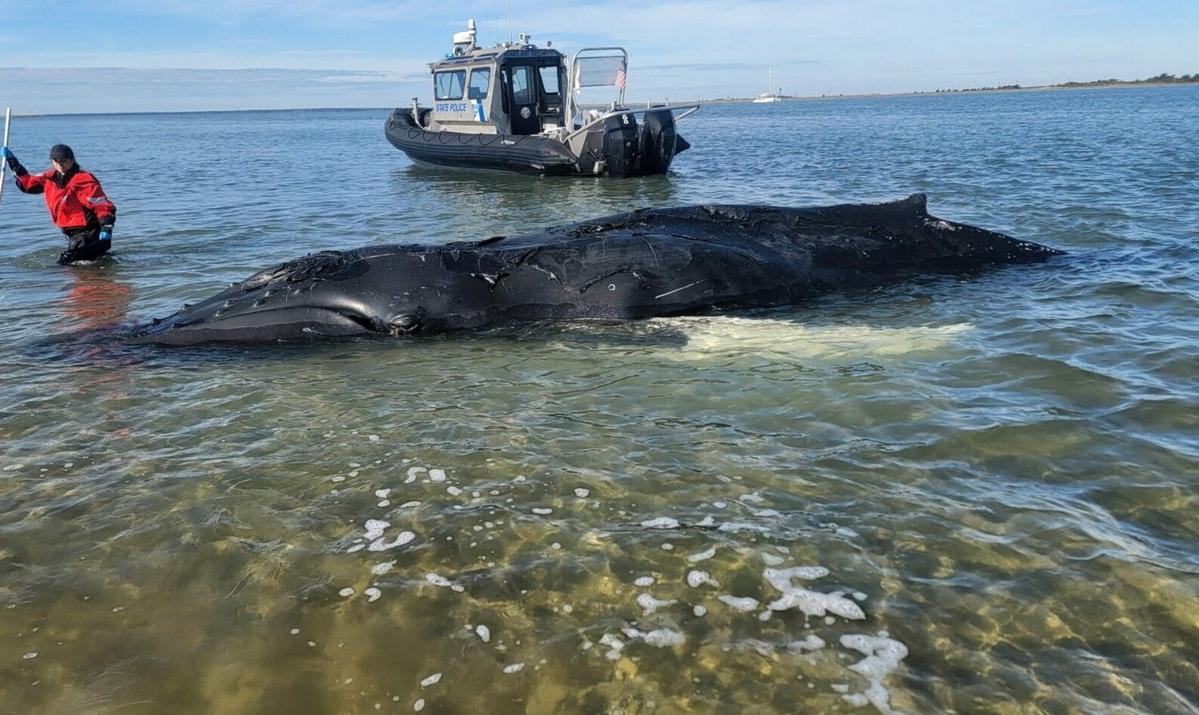An injured Humpback whale that was spotted on Friday in shallow water off the coast of Holgate, on the southern end of Long Beach Island, has died.
Marine Mammal Stranding Center Says Whale’s Condition Was Dire
Brigantine’s Marine Mammal Stranding Center was notified on Friday afternoon about the whale sighting.
The MMSC contacted the US Coast Guard Air Station Atlantic City for assistance to confirm the animal’s location.
A USCG helicopter on a routine flight was able to divert its flight path to locate the whale just before sunset on Friday.
The whale appeared to be beached on a sandbar and was only accessible by boat. Due to the lack of daylight, operations were suspended until Saturday morning.
The MMSC says the whale was a 29-foot, young Humpback whale that appeared to be lethargic and very thin.
Wounds from a previous propeller strike were noticeable across both the left and right dorsal sides of the whale. After the medical assessment, it was determined that the whale’s prognosis was extremely poor and that it was unlikely to survive.
The impact of a stranding on a whale that large is traumatic, as their body weight and organs are normally supported by the water around them.
When a whale is stranded for any length of time, their own body weight causes crushing damage to their internal organs, which lessens their chances of survival.
The decision was made to humanely euthanize the whale to prevent further suffering.
Decision Was Made to Wait Until Sunday Morning
When a traditional euthanasia solution is used, the body must be removed from the site and properly disposed of, as the tissues become highly toxic to the environment and any other animals that may eventually feed on the carcass.
Local landing sites were unavailable due to heavy beach erosion from the previous week’s storm, which hindered the removal of the animal from the area for proper disposal, so an alternative method of euthanasia would need to be employed.
Darkness and the incoming tide prevented anything from being done with the whale until Sunday.
Sedatives were given to keep the whale comfortable until operations could resume safely following Sunday’s low tide.
Sunday morning, the crew from Sea Tow of Atlantic City went out to check on the animal shortly after high tide and discovered that the whale had passed away during the night.
MMSC staff arrived a short time later to examine and confirm that the whale was deceased.
In early October, the whale was seen by a passing cruise ship near New York City, and it was evident that the animal had suffered significant trauma due to propeller strikes.
The staff of the Marine Mammal Stranding Center left a message on its Facebook page expressing their sorrow at the whale’s death.
Our entire team is deeply saddened by every deceased animal that we investigate, but the ones that hit the hardest are animals like this young whale who never got the chance to contribute to their species.
NJ State Police: 10 of New Jersey’s Most Wanted Fugitives
Gallery Credit: Eddie Davis
More Cold Cases: South Jersey’s Unsolved Murders & Mysteries
Gallery Credit: Eddie Davis

